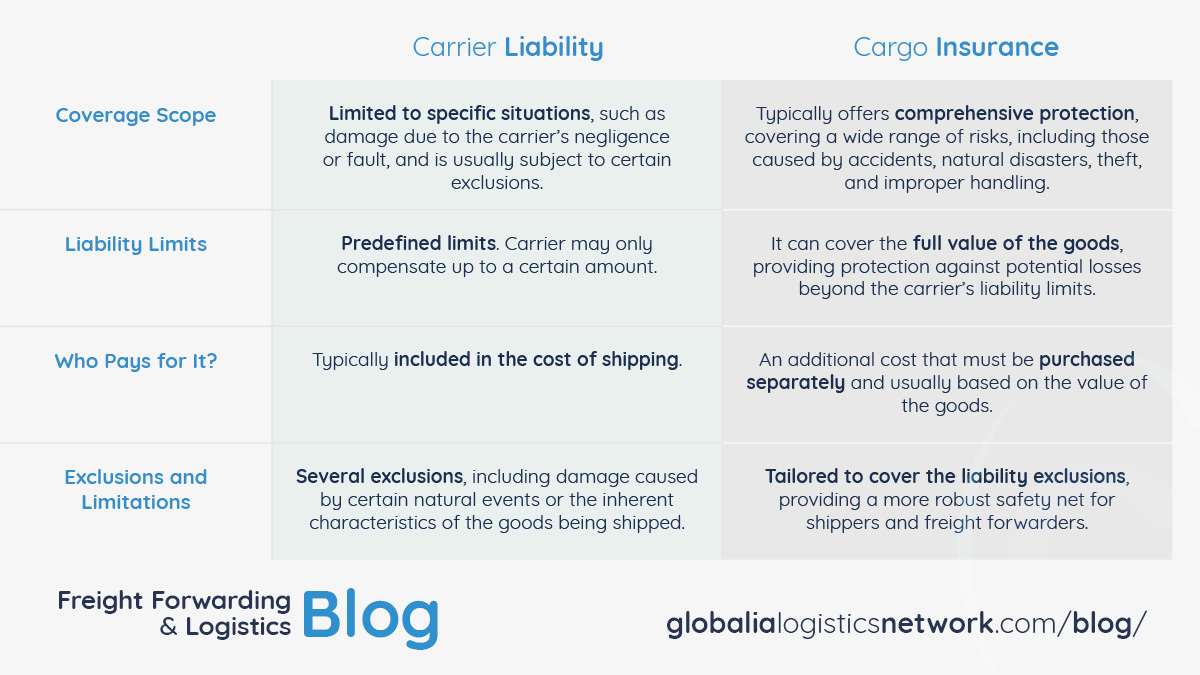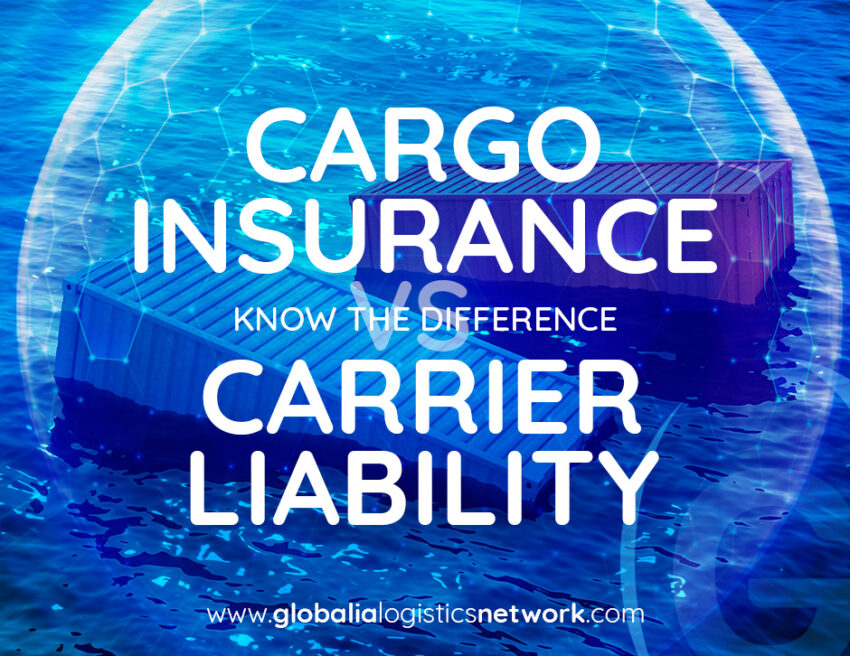In the world of logistics and freight forwarding, understanding the nuances of cargo insurance and carrier liability is essential. As a freight forwarder, it’s your responsibility to ensure that your clients’ shipments are delivered safely and without incident. However, what happens when things go wrong? Who bears the financial burden when goods are damaged, lost, or delayed during transit?
This is where cargo insurance and carrier liability come into play. While both serve to protect goods during transportation, they differ in coverage, responsibility, and scope. It’s crucial for freight forwarders to understand these differences to provide the best service to their clients and mitigate potential risks.
In this blog, we will explain the differences between cargo insurance and carrier liability and why it is important for freight forwarders to consider both when managing shipments.

What is Cargo Insurance?
Cargo insurance is a specialized type of coverage designed to protect the goods being transported in case of damage, loss, or theft. It covers a wide range of potential risks, including natural disasters, accidents, theft, and even improper handling of goods. Cargo insurance is typically purchased by the shipper, freight forwarder, or consignee, and is essential for shipments that carry high-value or fragile items.
This type of insurance can be tailored to specific shipments, depending on the cargo’s nature, value, and the mode of transportation. There are various types of cargo insurance policies available, including all-risk and named-perils coverage, each offering varying levels of protection.
Benefits of Cargo Insurance:
-
Comprehensive Protection: Cargo insurance can cover almost all risks during transit, including natural disasters, accidents, and theft, unless explicitly excluded in the policy.
-
Peace of Mind: With cargo insurance, both the shipper and the freight forwarder can rest assured knowing that they are financially protected if something goes wrong.
-
Customizable: Cargo insurance policies can be tailored to meet the specific needs of a shipment, offering flexibility depending on the value of goods and the level of risk involved.
What is Carrier Liability?
Carrier liability refers to the legal responsibility of a carrier (such as a shipping line, trucking company, or air freight provider) for the safe delivery of goods entrusted to them. When a freight forwarder contracts with a carrier to transport goods, the carrier assumes a certain level of liability for the cargo during transit. This liability is defined by the terms and conditions of the carrier’s contract and may be governed by international conventions such as the Hague-Visby Rules, Carmack Amendment, or the Montreal Convention.
Carrier liability generally covers situations where the goods are damaged, lost, or delayed due to the carrier’s negligence or fault. However, it is important to note that carrier liability is usually limited to specific circumstances and may not cover all types of damage or loss.
Key Features of Carrier Liability:
-
Limited Coverage: Carrier liability typically offers limited financial protection, with a cap on the amount the carrier is liable for. This means that, in the event of significant damage or loss, the shipper or freight forwarder may need to absorb the difference.
-
Exclusions: Carrier liability often excludes coverage for certain risks such as natural disasters, acts of war, or damage due to the inherent nature of the goods.
-
Legal Obligations: Carrier liability is governed by international treaties and conventions, which means the carrier is legally obligated to compensate for damage or loss under certain circumstances, but within specific limitations.
Key Differences Between Cargo Insurance and Carrier Liability
While both cargo insurance and carrier liability aim to protect shipments during transit, the two differ significantly in terms of coverage, responsibility, and claims processes. Below are the key differences:
1. Coverage Scope
The most significant difference between cargo insurance and carrier liability is the scope of coverage. Cargo insurance typically offers comprehensive protection, covering a wide range of risks, including those caused by accidents, natural disasters, theft, and improper handling. On the other hand, carrier liability is limited to specific situations, such as damage due to the carrier’s negligence or fault, and is usually subject to certain exclusions.
For instance, if a cargo ship sinks due to a storm, cargo insurance may cover the loss of the goods, but carrier liability would likely not apply if the damage was caused by a force majeure event like a natural disaster.
2. Liability Limits
Carrier liability comes with predefined limits, which means that even if the carrier is legally responsible for the damage or loss, they may only compensate up to a certain amount. These limits can be quite low, depending on the type of cargo and the carrier’s terms and conditions. For example, in international air transport, the carrier’s liability might be limited to a set amount per kilogram of cargo.
Cargo insurance, however, can cover the full value of the goods, providing protection against potential losses beyond the carrier’s liability limits. This is especially important for high-value shipments where the carrier’s liability might fall short of covering the entire cost of the goods.
3. Who Pays for It?
Carrier liability is typically included in the cost of shipping, meaning that the shipper or freight forwarder does not need to purchase additional coverage for the carrier’s liability. However, this means that the coverage is limited, and if the value of the goods exceeds the carrier’s liability limit, the shipper may need to cover the difference.
Cargo insurance, on the other hand, is an additional cost that must be purchased separately. The cost of cargo insurance is usually based on the value of the goods being shipped, the destination, and the level of risk involved in the transportation process. In many cases, freight forwarders purchase cargo insurance on behalf of their clients to provide comprehensive protection for the goods being shipped.
4. Exclusions and Limitations
Carrier liability often comes with several exclusions, including damage caused by certain natural events (such as earthquakes or floods) or the inherent characteristics of the goods being shipped (for example, perishable items). Cargo insurance can be tailored to cover these exclusions, providing a more robust safety net for shippers and freight forwarders.
Why Freight Forwarders Need Both
For freight forwarders, it’s crucial to understand that relying solely on carrier liability may not provide sufficient protection for their clients. While carrier liability can cover some risks, it often comes with limitations that may leave goods exposed to additional risks. Cargo insurance offers an additional layer of protection, ensuring that shipments are fully covered for a wide range of potential issues.
By recommending both cargo insurance and carrier liability to clients, freight forwarders can offer a comprehensive risk management solution. Cargo insurance ensures that clients’ goods are fully protected in case of loss or damage, while carrier liability provides a legal fallback if the carrier is found at fault.
Conclusion
Understanding the difference between cargo insurance and carrier liability is essential for freight forwarders who want to provide comprehensive services to their clients. While carrier liability offers some protection, it often comes with limited coverage and exclusions. Cargo insurance, on the other hand, provides broader and more customizable protection, ensuring that goods are covered for a wide range of risks during transit.
By offering both options to your clients, you ensure that their shipments are fully protected, providing peace of mind and safeguarding their investments. Ultimately, the combination of cargo insurance and carrier liability can help freight forwarders manage risk and maintain strong, trustworthy relationships with their clients.


